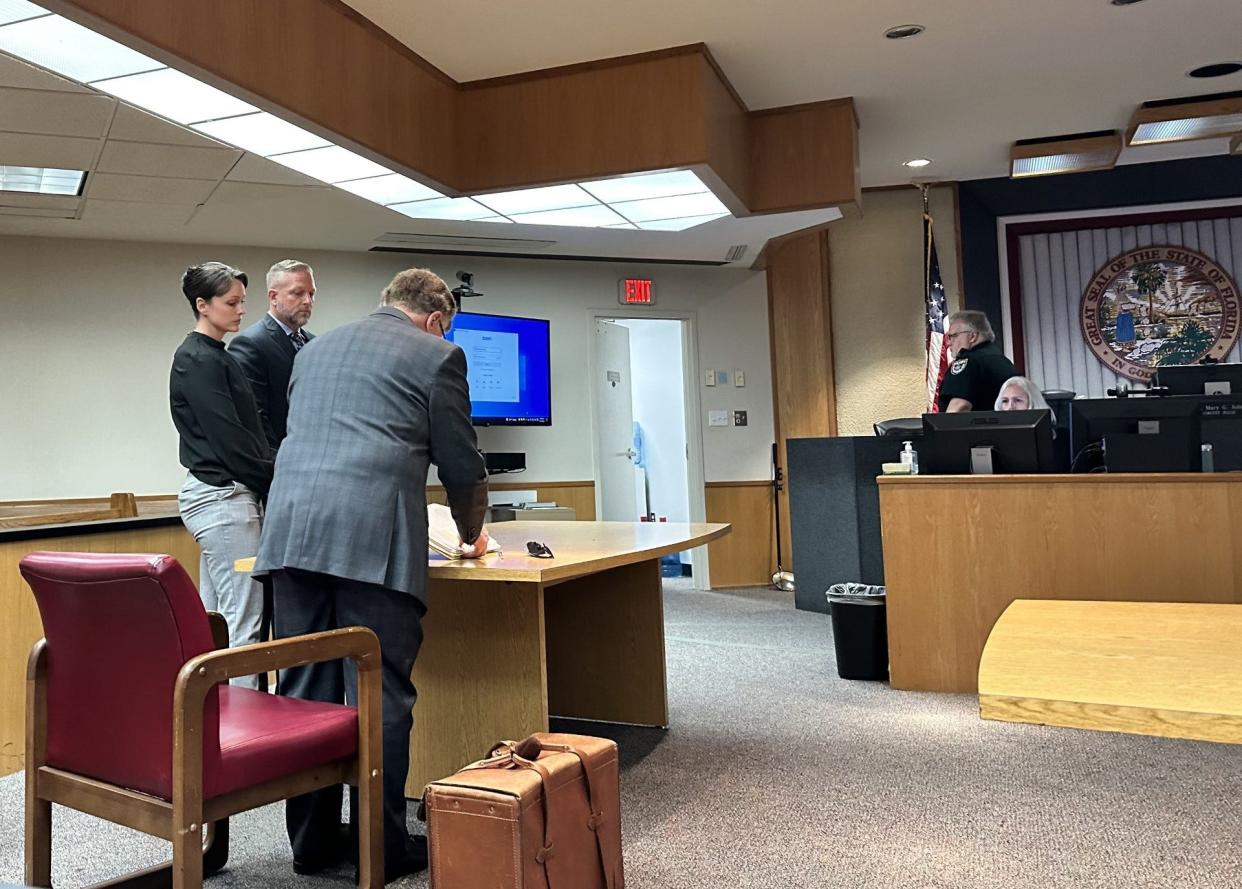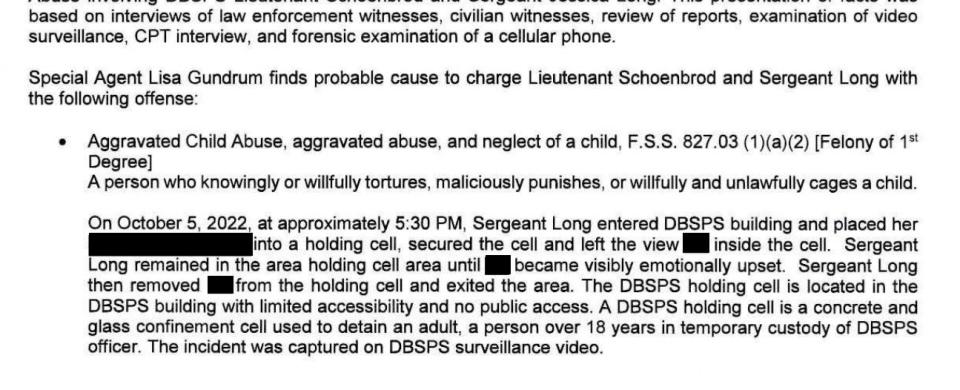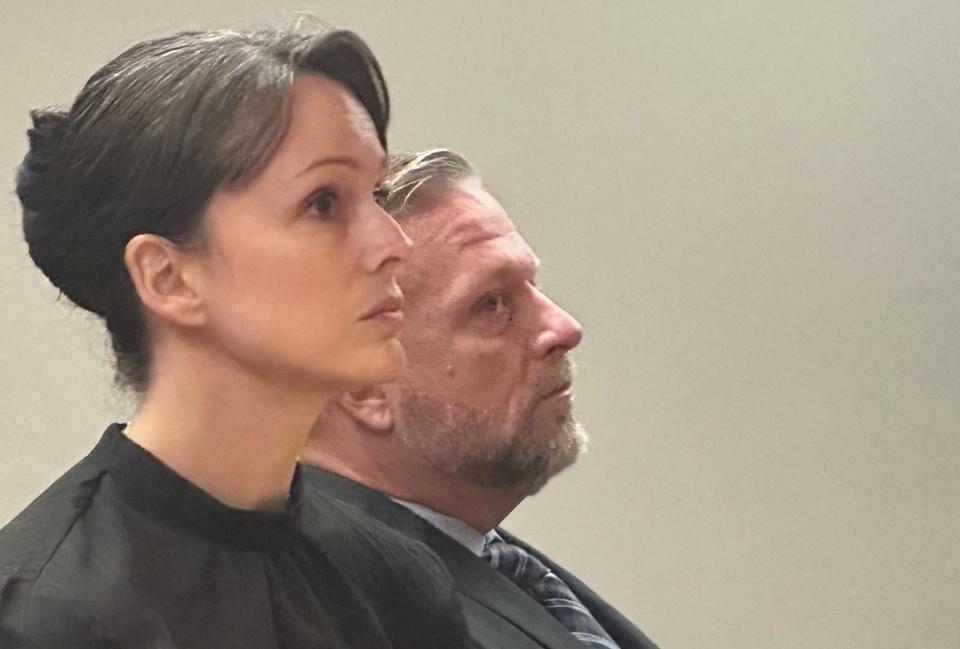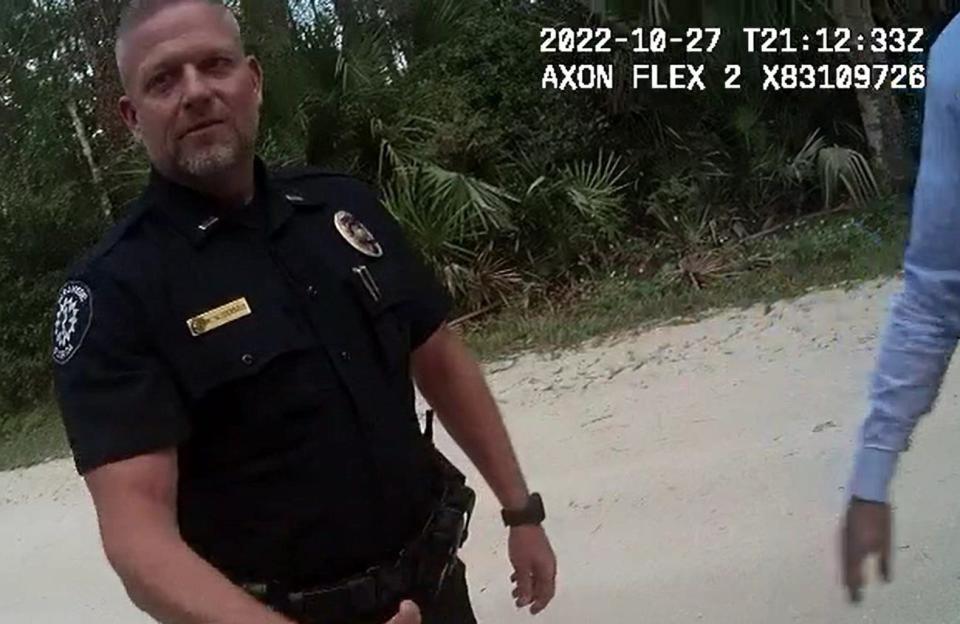FDLE investigator recommended charge of aggravated child abuse against Shores officers

A Florida Department of Law Enforcement investigator found cause to charge two Daytona Beach Shores police officers with aggravated child abuse, a first-degree felony after they jailed their 3½-year-old son for a potty-training lesson, newly released documents show.
The State Attorney's Office declined to prosecute Lt. Michael Schoenbrod and Sgt. Jessica Long, pointing to a Department of Children & Families determination that there was "no impending danger" to the boy and no need for departmental services or intervention.
The new details are contained in records provided to The News-Journal Friday by the State Attorney's Office following a public records request and a judge's ruling on Monday that made the FDLE report and other filings public.

FDLE's investigation
An anonymous call to DCF reported that Schoenbrod, 44 at the time of the incidents, and Long, 36, took their child to the city's holding cell on Oct. 5 and Oct. 6 as part of a potty-training lesson.
When DCF interviewed Schoenbrod and Long on Oct. 27, two Volusia County Sheriff's Office personnel accompanied the caseworker. Body camera footage from one included large portions of the caseworker's interview, and afterward, the sheriff's office requested FDLE investigate.
Special Agent Lisa Gundrum and at least two other agents conducted interviews. Schoenbrod and Long declined to talk to FDLE, but other Daytona Beach Shores officers did.

Sgt. Bill Phillips told investigators on Oct. 6 he saw Schoenbrod in a hallway facing a holding cell, with a child inside. The boy "did not appear to be in any distress, but at some point had been crying," the FDLE report states.
Detectives Daniel Carranzana and Gary Malphurs, as well as Crime Analyst Kelley Register all told FDLE they had heard Long talking about having potty-training issues and trying a new approach, telling the boy something along the lines of "bad boys go to jail," and by not using the toilet, he was being a bad boy.
Carranzana and Malphurs told investigators Long had said when the child went potty somewhere other than the toilet, she and Shoenbrod had made the boy sit in the feces.
Video from inside the public safety building showed Long bringing the child inside on Oct. 5, then putting him into a holding cell, shutting the door, and walking around the corner to avoid being seen by the child. Later, she appeared to ask the child if he had to go potty, and she let him out and they walked to the bathroom.
Videos from Oct. 6 showed Schoenbrod and the child in handcuffs entering the booking area, then the lieutenant placing the boy onto a concrete bench in the holding cell. Schoenbrod then walked out of sight of the child and sanitized his hands before returning and leaving with the boy, the report states.
The FDLE report also included descriptions of images found on Long's cellphone, which was seized on Dec. 19. The images were sent on Oct. 6 by "McDreamy," including one of a handcuffed child upset in the backseat of a vehicle, plus two photos and one video showing the child in the holding cell.
The phone's user messaged "McDreamy": "Oh my goodness. This is crazy we're going to this length."
Based on the evidence gathered in her investigation, Gundrum wrote on Jan. 11 to the State Attorney's Office that she "finds probable cause" to charge Schoenbrod and Long with aggravated child abuse. She included a legal description of the charge: "A person who knowingly or willingly tortures, maliciously punishes or willfully and unlawfully cages a child."

State attorney's rationale to not prosecute
Assistant State Attorney Ashley Terwilliger, in a Feb. 7 memo detailing her analysis to not charge the officers, cited several reasons, including a determination by a child protective investigator that the boy was "safe."
DCF determined there was "no impending danger to the child," and that no additional services or interventions were needed, Terwilliger wrote.
She cited a DCF child protection investigator's review of video showing the child was in the holding cell for less than five minutes on Oct. 5, and on Oct. 6, Schoenbrod led the child into the cell "with large, loose-fitting handcuffs" on his arms.
"The child did not appear upset when the father opened the cell door," Terwilliger wrote.
She did not note the length of time the child was in the cell on Oct. 6. Schoenbrod told the DCF it had been "13 minutes or something like that."
A child-protection investigator interviewed Schoenbrod's mother, who stated the parents are "excellent, loving and caring," Terwillinger's memo states.
She quoted the DCF's determination that the boy was safe: "Final risk level is low."
Terwilliger's conclusion: "Evidence shows no physical or mental injury to the child."
Battle over public records
In two orders signed Thursday, Volusia Circuit Judge Mary Jolley referenced Florida statutes governing DCF services and the state's public-records law, which presumes all government records are open unless otherwise exempted.

Her orders followed a hearing Monday at which an attorney representing the Florida Center for Government Accountability and The News-Journal called for the records to be opened. The full FDLE report was 74 pages.
However, Daytona Beach Shores and FDLE were still withholding records Friday, with officials citing a temporary restraining order that had been granted after Schoenbrod and Long petitioned the court asking that the records remain confidential.
In that petition, attorney Michael Lambert wrote that DCF determined the FDLE conclusion was "unfounded," the state attorney declined to prosecute, and the city of Daytona Beach Shores did not sustain an allegation that the officers committed a crime. He was able to get a judge to sign an order determining that allegations stemming from an anonymous complaint "would subject these formerly accused petitioners, their child and family to undeserved and unwanted public scrutiny."
Lambert could not be immediately reached for comment after 5 p.m. Friday.
Paul Waters, an attorney representing Daytona Beach Shores, said Friday the city's professional standards investigation into Schoenbrod and Long, which has concluded, remains sealed.
"Those records are still confidential under the court's temporary injunction order," Waters wrote in an email Friday.
"We will not violate a standing court order, nor I suspect would you if in our position," he wrote.
Also this week, Gretl Plessinger, FDLE's communications director, wrote that the agency was awaiting "the written order and a final hearing date to be set regarding the injunction" before processing its records.
An evidentiary hearing on the temporary restraining order was scheduled for Aug. 15, the court file shows.
The State Attorney's Office and Volusia County Clerk's Office both unsealed previously closed records Friday after the judge's orders were distributed.
Public records advocates argued that those orders should have resolved the concerns raised by the city and FDLE regarding the restraining order.
Lonnie Groot, a part-time Daytona Beach Shores resident who formerly served as the city attorney, has been fighting for records to be opened. He said in an email Friday he has been watching the city government for about 50 years.
"(I) have seen greatness, egocentric weakness, calculation in every move and breath," Groot wrote, "but I have never seen the quest to hide, hide, hide as is the case in this matter."
Michael Barfield, director of public access initiatives at the Florida Center for Government Accountability, said after reviewing the matter: “This is the most egregious sealing of court records I’ve ever heard of. The effort to cover up the actions of these two officers is astounding. The citizens of Daytona Beach Shores and Volusia County deserve better.”
Open records sought: Nonprofit asks judge to open records in case involving Daytona Beach Shores officers
This article originally appeared on The Daytona Beach News-Journal: State attorney declined to prosecute 2 Daytona Beach Shores officers

